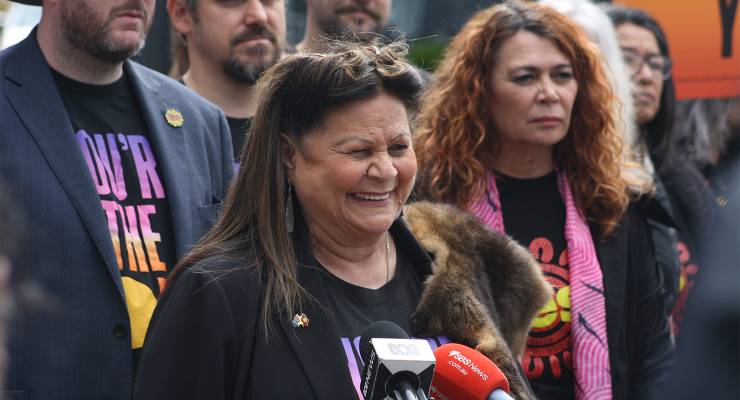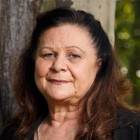
Despite the best intentions of many, a glaring life-expectancy gap persists between Aboriginal and non-Indigenous people due to the brutal, rapid colonisation that disastrously impacted our way of life. When our lands were invaded, our people were disempowered. Taken from us were our ways of knowing, being and doing; our culture.
Aboriginal and Torres Strait Islander communities continue to suffer, experiencing disproportionately poorer health and well-being. The 2023 Closing The Gap annual data report found an increase in suicides, families having their children taken, adults being incarcerated, and worsening outcomes in early childhood development. This is completely unacceptable.
Significant barriers continue to prevent communities from presenting to mainstream health services, with the biggest obstacle in recent decades being racism, which it pains me to say is still alive and well within Australian society.
We saw racism rear its ugly head in the lead-up to and aftermath of the Voice to Parliament referendum, with many Aboriginal people and organisations subjected to vile hate mail and online abuse; myself included.
Then there’s the lack of trust in governments and mainstream service providers, stemming from the atrocities that are the lived experience of many still alive today. My mother, a proud Gunditjmara woman, has had to live with the pain of having six of her children taken from her. To this day, she still carries the guilt and blame for something that was not her fault.
My brothers and sisters lived with this trauma — of being taken from their mother, their family, their community and their culture. As a result, they suffered greatly as adults. Despite experiencing many serious setbacks that severely hindered their well-being, they found it almost impossible to present to health services. They died at a young age, decades before the life expectancy of 81.2 years for non-Indigenous men and 85.3 years for non-Indigenous women.
The solutions are complex, but there is one thing we do know: we don’t need another “Close The Gap” statement of intent. We need action, and most importantly we need Aboriginal health to be put in Aboriginal hands.
The solution lies in the vital work carried out by Aboriginal community-controlled health organisations (ACCHOs), which for over half a century have delivered extraordinary health and well-being outcomes for communities by providing services within an environment and atmosphere where culture is celebrated. Aboriginal people established these organisations, manage the clinics and run the services. They’ve transformed the lives of many and their families.
ACCHOs understand the importance of the relationship between people and their communities, places, cultures and Country when assessing whether somebody is holistically healthy. They know their communities better than anyone, and by applying 65,000-plus years of Aboriginal knowledge and culture, they remove barriers and help us feel safe and heal.
Unfortunately, many ACCHOs are fighting with one arm tied behind their back, forced to carry out urgent work with insufficient funding. Some are given piecemeal support to stem the tide, but few are being financed to provide the complex and diverse range of care required. Without this support, ACCHOs can’t provide vital prevention support to keep families safe and strong, which leads to better education outcomes and employment prospects, and in turn, helps break cycles of disadvantage.
When Aboriginal health is in Aboriginal hands, the best quality care will be available, but there will of course be times when specialist and critical urgent care is required by the mainstream health system. That is why, alongside greater investment into ACCHOs, we need broader health system reform so that we create culturally safe healthcare experiences for Aboriginal and Torres Strait Islander peoples.
The Victorian Aboriginal Health and Wellbeing Partnership Agreement Action Plan 2023-2025 is a roadmap of initial, urgent steps that must be implemented to progress real change. All levels of government need to ramp up support for Aboriginal organisations so that they aren’t just helping communities survive, but empowering them to thrive.
ACCHOs hold the key to taking meaningful steps toward closing the life expectancy gap, but they can’t do it alone. They must be empowered so they can continue to ensure that the disadvantages that have long held back our people do not define the legacy of the next generation.
It’s too late for my siblings, but there remain many, many people just like them who don’t know where to go and need help. But we know the help that is needed, we know the solutions for change. We just need to invest in them.








Where I live we do see Aboriginal children taken, but in very extreme situations, usually drug related. A good many are in kinship care, but we are getting short of aunties and grannies. I do know for sure though that my community and my school has achieved a lot with reaching out and getting as much Aboriginal involvement as possible. It doesn’t always work but mostly it does. The current setup does not.
Isn’t the main problem that you can’t get doctors and nurses to go to remote communities?
That doesn’t really explain health inequities in urban areas.
Are there health inequities in urban areas, controlling for income, education etc? If so, any idea why?
Change is happening.
See: CSIRO PUBLISHING. Australian Health Review, 2022, 46, 178–184. “Development and implementation of a shared governance model in a mainstream health unit: a case study of embedding Aboriginal voices in organisational decision making” https://doi.org/10.1071/AH20369
Is such distributed decision-making being implemented across the board? Perhaps not, if Ms Gallagher knows what she’s talking about.
If an appeal like this cannot be hear and acted on, then Australia is actually as bad as the world sees us. We discounted the Voice because we did not believe it was needed. Here is a voice offering a possible solution; let us LISTEN and trial the suggestion, because our current solutions do not work!
Why is it that only Indigenous authors are described as “proud” and why is the non Indigenous side of their heritage almost never acknowledged?
I can’t speak for Indigenous people but I can speak as a person who is half Asian – my White Australian parent is never, ever questioned as whether she is really Australian. I have never been discriminated against because my White heritage. I have been verbally abused on train stations and told to speak English simply because of my appearance (I can only speak English). My White heritage is reinforced every day through just about every cultural practice in Australia. In contrast, it’s a struggle to even get people to pronounce my last name properly.
Another way to put it is because the source of their marginalisation is typically not their Indigenous side.